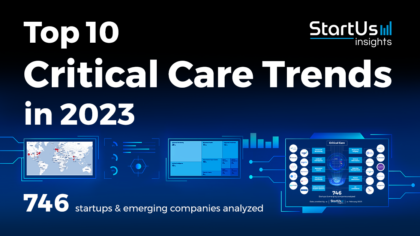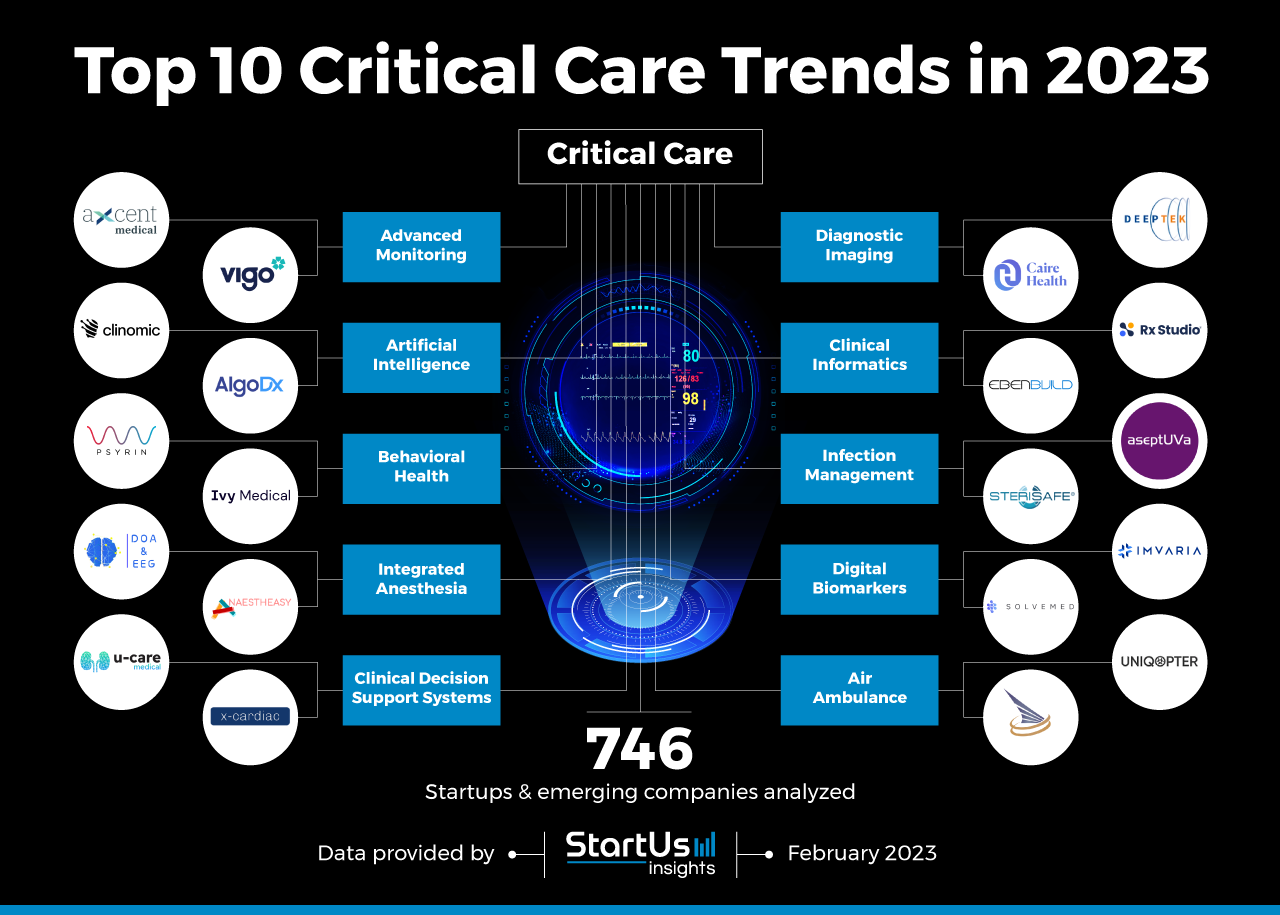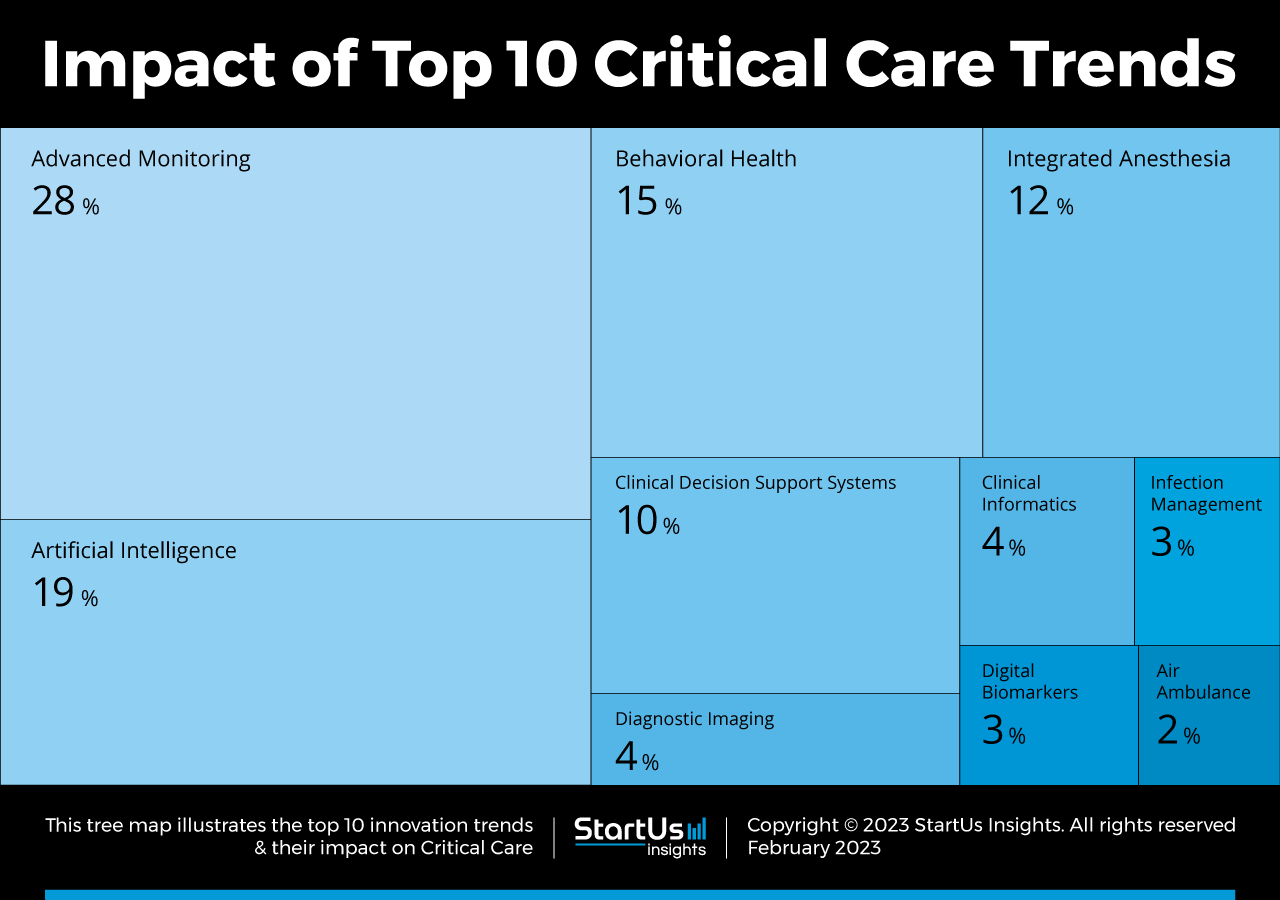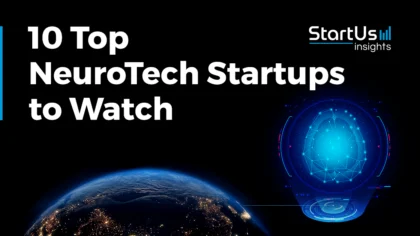Accelerate Productivity in 2025
Reignite Growth Despite the Global Slowdown
Emergency care provides life-saving medical treatment and support to critically ill or injured patients with complex medical conditions. Therefore, critical care requires close monitoring. Innovations in the field address challenges such as limited resources and time-sensitive decision-making for triaging. Moreover, intensive care units (ICUs) are able to improve patient outcomes through non-invasive vital sign monitoring. This research provides you insights into such top 10 global critical care trends and innovations. They range from artificial intelligence (AI) and behavioral health to infection management solutions and air ambulances. Read more to explore them in detail and discover how they improve care delivery.
Innovation Map outlines the Top 10 Critical Care Trends & 20 Promising Startups
For this in-depth research on the Top Critical Care Trends & Startups, we analyzed a sample of 746 global startups & scaleups. The result of this research is data-driven innovation intelligence that improves strategic decision-making by giving you an overview of emerging technologies & startups in the healthcare industry. These insights are derived by working with our Big Data & Artificial Intelligence-powered StartUs Insights Discovery Platform, covering 3 790 000+ startups & scaleups globally. As the world’s largest resource for data on emerging companies, the SaaS platform enables you to identify relevant startups, emerging technologies & future industry trends quickly & exhaustively.
In the Innovation Map below, you get an overview of the Top 10 Critical Care Trends & Innovations that impact 746 companies worldwide. Moreover, the Critical Care Innovation Map reveals 20 hand-picked startups, all working on emerging technologies that advance their field.
Top 10 Critical Care Trends
- Advanced Monitoring
- Artificial Intelligence
- Behavioral Health
- Integrated Anesthesia
- Clinical Decision Support Systems
- Diagnostic Imaging
- Clinical informatics
- Infection Management
- Digital Biomarkers
- Air Ambulance
Tree Map reveals the Impact of the Top 10 Critical Care Trends
Based on the Critical Care Innovation Map, the Tree Map below illustrates the impact of the Top Critical Care Trends in 2023. Advanced monitoring solutions allow medical professionals to monitor various vital signs while AI analyzes electronic health record (EHR) data to provide insights. Advances in diagnostics imaging and clinical informatics provide doctors with quantitative and qualitative data along with clinical decision support. Besides, behavioral healthcare tackles mental health-related emergencies with innovations in integrated anesthesia. While most solutions focus on the immediate problem, infection management focuses on keeping patients and hospital environments clean to prevent infections. Lastly, digital biomarkers enable medical professionals to assess and track medical conditions while air ambulances speed up access to healthcare in emergency situations.
Global Startup Heat Map covers 746 Critical Care Startups & Scaleups
The Global Startup Heat Map below highlights the global distribution of the 746 exemplary startups & scaleups that we analyzed for this research. Created through the StartUs Insights Discovery Platform, the Heat Map reveals that the US sees the most startup activity.
Below, you get to meet 20 out of these 746 promising startups & scaleups as well as the solutions they develop. These critical care startups are hand-picked based on criteria such as founding year, location, funding raised, & more. Depending on your specific needs, your top picks might look entirely different.
Top 10 Critical Care Trends in 2023
1. Advanced Monitoring
The absence of efficient diagnostics in critical care units often leads to delayed detection of medical issues. However, advances in monitoring devices solve these problems by consolidating patient monitoring through comprehensive vital sign parameter tracking. For this, startups develop wearable devices or data processing solutions that monitor vital parameters to detect deviations in real-time. These monitoring solutions improve the detection of changing medical conditions, thus enabling healthcare professionals to provide quick and effective patient care.
aXcent medical manufactures Multi-Parameter Patient Monitors
German startup aXcent medical develops medical devices for basic and advanced patient monitoring. The startup’s product, CETUS x12, is a multi-parameter patient monitor that features an 8-waveform display, 12-lead ECG analysis, pacemaker detection, arrhythmia analysis, and more. Additionally, aXcent medical’s outpatient device, PAVO, is configurable with flexible parameters to accommodate different clinical environments. The wide range of vital sign tracking enables better care of patients from emergency units to intensive care.
Vigocare advances Continuous Patient Monitoring
Indian startup Vigocare offers Vigo Vitals, a software-as-a-service (SaaS) platform to continuously monitor patients. It is an integrated patient vitals monitoring solution that detects patient deterioration using algorithms. The platform provides proactive clinical decision support and also features integration with wireless devices. It centralizes data in a command center and shows historic vital sign trends. This solution enables healthcare professionals to monitor patients in post-surgical, general, or specialty wards and homes.
2. Artificial Intelligence
The demanding nature of intensive care units often results in the limited availability of resources such as beds, staff, and equipment. To address this, AI-based solutions in emergency medicine, medical imaging, and clinical decision support provide more personalized patient care. Moreover, such solutions use algorithms to interact with patients, analyze their health data, and deliver accurate clinical information based on unique patient needs and characteristics. By rapidly analyzing large amounts of medical data, AI solutions allow critical care units to create and implement precise medication plans, reducing the burden on staff.
Clinomic develops a Smart Bedside Device
Clinomic is a German startup that creates Mona, an AI-powered smart medical assistant device for critically ill patients. It combines translational medical research, data science, and computational intelligence to listen, process, and answer queries while displaying necessary information on its screen. Mona features a high-speed ultra-low latency intelligence chipset, a 60 Ghz localization chip, and a 4k camera for telemedical applications. It thus enables intensive care units in hospitals and clinics to provide more dedicated patient care through AI-based assistants.
AlgoDx advances Precision Medicine
Swedish startup AlgoDx develops an AI platform for precision medicine targeting intensive care. It uses AI to process high volumes of high-fidelity clinical data for early detection of patient deterioration. Moreover, the platform’s machine learning algorithms assist in clinical decision-making in intensive care units for unmet medical conditions. The startup’s other AI-based product, NAVOY, predicts sepsis and acute kidney injury. AlgoDx thus enables precision medicine with electronic medical records (EMRs) to provide medical professionals with accurate patient diagnosis, prediction, and treatment support.
3. Behavioral Health
The critical care environment has a significant impact on the psychological well-being of both patients and healthcare providers. Patients often experience stress and trauma from critical illness and treatment while healthcare workers suffer from mental fatigue due to long and demanding work hours. Advances in medical treatments and devices reduce the sensory overload experienced by patients after treatment aiding their recovery. Additionally, the use of smart devices, wearables, and software enables the early identification of psychological issues in patients and healthcare workers. This allows for prompt intervention and support.
Ivy Medical provides Infusion Therapy
Ivy Medical is a Dutch startup that offers medical devices to perform safe and uninterrupted infusion therapy. The startup’s device, Ivy Duo+, features a scheduler, pressure detection, automatic air vents, and a wearable pump for patient mobility. Moreover, to alleviate mental stress, it reduces the number of alarms, unlike current infusion pumps. In this way, the system serves to improve patient sleep and aid recovery by avoiding sleep loss.
Psyrin simplifies Psychosis Detection
Psyrin is a UK-based startup that specializes in psychosis care through speech and AI. The startup’s solution detects psychosis early throughout the care pathway using a mobile application. The mobile app requires only 5 minutes of speech from responses to intuitive tasks to enable clinicians to quickly and objectively triage patients. Moreover, this solution lets healthcare providers monitor psychosis patients for relapse.
4. Integrated Anesthesia
One of the main challenges in anesthesia is ensuring the continuous and accurate monitoring of patient stability during surgery and detecting adverse reactions. Further complications include the presence of co-existing medical conditions and the use of multiple medications. To address these challenges, startups are developing wearable sensors that provide real-time monitoring of vital patient parameters. Additionally, innovations in simulation and training tools improve the skills and knowledge of anesthesia providers. This enhances patient safety and reduces the risk of adverse events.
DOA & EEG aids Anesthesia Level Monitoring
Canadian startup DOA & EEG specializes in electroencephalogram (EEG)-based closed-loop monitoring of anesthesia. It utilizes direction-of-arrival (DoA) feature extraction, machine learning, and EMG signal reduction for real-time infusion calculation. Moreover, the solution identifies specific cardiac and pulmonary risk factors to reduce perioperative risks and improve surgical outcomes.
Anestheasy provides Anesthesia Training Simulation
UK-based startup Anestheasy makes virtual reality (VR)-based anesthesia training simulator. The simulations feature training modulus in inferior alveolar nerve block, intravenous regional anesthesia, and also support touchable haptics. This way, Anestheasy’s technology provides a highly realistic and immersive experience for trainees. This allows them to practice complex procedures and scenarios in safe environments.
5. Clinical Decision Support Systems
The time-sensitive nature of critical illnesses demands accurate diagnosis and treatment recommendations. However, the complex medical history of patients and the heavy workloads of healthcare providers make quick decision-making a challenge. That is why startups are offering clinical decision support systems (CDSS) that provide real-time access to patient data and clinical guidelines. This includes demographics, symptoms, vital signs, laboratory results, medical literature, and more, enabling informed treatment decisions. Besides, many CDSS solutions leverage machine learning, natural language processing (NLP), or knowledge databases for accurate medical diagnostics.
U-Care Medical aids in Kidney Disease Detection
U-Care Medical is an Italian startup that specializes in AI-powered, real-time prediction of future and persistent acute kidney injuries. The startup’s platform uses data from sensors and a bias-free clinical dataset to analyze non-linear correlations between patient parameters. It also easily integrates with hospital EHR systems to provide real-time insights to detect kidney failure and reduce ICU mortality rates.
x-cardiac simplifies Postoperative Complication Detection
x-cardiac is a German startup that develops AI products to detect postoperative complications such as bleeding and injury. The startup’s AI-driven software, x-c-bleeding, predicts postoperative bleeding after heart surgery, enabling proactive action before serious consequences occur. Besides, x-cardiac’s other product, x-c-renal-injury, focuses on the early detection of renal injury and serves to reduce stimulus and data overload on ICU doctors. x-cardiac’s products thus assist hospitals to reduce mortality rates, improve patient care, and reduce burnout among medical staff.

6. Diagnostic imaging
Current medical imaging systems face issues such as limited data storage, inconsistent imaging data, and the absence of automatic analysis. Due to the crucial role of diagnostic imaging in medical care, startups are integrating AI and machine learning to streamline and automate diagnostic image interpretation. Such smart imaging solutions accurately diagnose problems and highlight key findings, saving time for medical specialists and eliminating manual reviews. By improving the efficiency and accuracy of diagnostic imaging, these advances significantly impact the quality of patient care in critical care settings.
DeepTek offers Automated Pleural Effusion Detection
Indian startup DeepTek makes AI-powered radiology solutions for accurate and affordable radiology interpretation. The startup’s platform, Augmento, includes several AI models in chest pathologies like pleural effusion, tuberculosis, pneumonia, and more. It also detects knee and spine problems. Further, Augmento’s AI provides a lower turnaround time for reports as it allows radiologists and imaging experts to read more scans in a shorter period. This reduces stress and burnout rates.
Caire Health creates Imaging Intelligence
US-based startup Caire Health specializes in AI imaging solutions for hospitals and emergency rooms. The startup’s solution, Caire Head CT, utilizes AI to detect or rule out intracerebral hemorrhages (ICH). It also localizes and quantifies them, identifies the degree of midline shift, and more. Moreover, the solution reduces workloads by automating tasks like calculating ventricle volume and removing human error in radiologist diagnosis. Through this solution, hospitals are able to discharge patients with emergent findings faster while reducing treatment delays for critical cases.
7. Clinical Informatics
The importance of clinical informatics in emergency care is growing due to the need for accurate and up-to-date patient information that drives informed decisions. Clinical informatics solutions automate routine tasks, such as ordering tests and medications, and provide alerts for potential adverse events or drug interactions. It also makes efficient workflows, which is crucial for emergency care as it minimizes delays, optimizes resource utilization, and improves patient outcomes. Besides, clinical Informatics allows for personalized treatments by analyzing patient medical history, metabolism, demographics, and other relevant factors. Streamlining processes and providing access to crucial patient information also assist healthcare providers to deliver the best possible care.
Rx Studio develops a Precision Dosing Platform
Rx Studio is a US-based startup that advances personalized drug dosing with a precision dosing platform. It assesses patient dose through the analysis of multiple factors from EHRs. This includes contextual information like demographics, medical history, therapeutic monitoring results, drug interactions, genetic risk factors, and metabolic pre-dispositions. The platform also uses statistical models to forecast drug responses and include models on the highly listed antibiotic drug molecules in use. Rx Studio’s solution serves as a decision support tool for pharmacists, pharmacologists, and physicians to provide pharmacogenomic and pharmacometrics recommendations.
Ebenbuild offers Quantitative Image Intelligence
German startup Ebenbuild provides precision therapy based on personalized high-fidelity digital twins. The startup’s quantitative and functional imaging software uses AI to automatically extract valuable insights from CT scans. It then creates patient-specific segmentations of the lung or identifies pathologies. The platform also performs automatic analysis to transform medical images into visualizations with quantitative reports and improve diagnostics. Moreover, the software provides clinical decision support for diagnosing patients suffering from acute respiratory distress syndrome (ARDS).
8. Infection Management
Critically ill patients face a higher risk of infection before treatment and during post-treatment care. Additionally, the spread of germs and infections increases the risk of developing drug-resistant pathogens, reducing the effectiveness of antimicrobial agents. To address these challenges, startups are creating disinfection solutions that utilize light, such as ultraviolet (UV) light, and gasses to eliminate harmful particles. Moreover, these innovations improve the safety and sustainability of disinfection procedures by reducing the toxicity of the products and making them environmentally friendly.
aseptUVa offers In-situ Catheter Disinfection
Swiss startup aseptUVa develops in-situ disinfection technology to prevent pathogenic colonization in and around different catheters. The startup’s solution utilizes light to disinfect the inner walls of in-situ catheters and thereby prevent hospital-acquired infections. Besides preventing infections, aseptUVa’s technology automates the disinfection process and reduces the burden on the medical staff.
STERISAFE provides Automatic Room Disinfection
STERISAFE is a Danish startup that specializes in automatic disinfection solutions for rooms and equipment. The startup’s product, STERISAFE PRO, autonomously moves from room to room, takes oxygen from the surrounding air, and performs whole-room disinfection. Its ozone-based disinfection process is reversible and turns the gas back into breathable oxygen once the disinfection process is complete. Further, the startup’s cloud platform enables automatic validation of the disinfection process and also centralizes disinfection monitoring.
9. Digital Biomarkers
Biomarkers provide valuable information on critically ill patients. However, current biomarker screening is slow and lacks biomarkers required for certain conditions. That is why startups are developing analytical solutions that quickly analyze large amounts of data to identify novel biomarkers. Other innovations include the use of machine learning and predictive models to identify problems in patients and benefit medical research, such as tracking disease progression. The use of advanced biomarker screening methods greatly improves the diagnosis and treatment of critically ill patients. Moreover, such solutions make diagnostics and treatments faster, more accurate, and more personalized.
IMVARIA improves Critical Clinical Assessments
US-based startup IMVARIA advances clinical assessments in serious diseases using AI in imaging and lab data. The startup’s digital biomarker, Fibresolve, serves as an adjunct in the assessment of interstitial lung diseases (ILDs), including idiopathic pulmonary fibrosis (IPF). The implementation of AI to analyze computed tomography (CT) images for specific, novel patterns avoids expensive, invasive surgical testing. Additionally, the startup’s cloud-based digital lab, Digital Biomarker Lab, analyzes cases and quickly returns results with accurate disease assessments and predictions. These solutions reduce the need for invasive diagnostic procedures and provide unique insights into disease diagnosis and assessment.
Solvemed facilitates Biomarker Validation
UK-based startup Solvemed develops digital evaluation tools to assess neuro-ocular biomarkers. The startup’s digital biomarkers combine computer vision and predictive analytics to de-risk clinical development. They also reduce the trial duration and costs, track disease progression, and demonstrate drug efficacy. Solvemed’s digital biomarkers thus replace expensive equipment in neurological diagnostics with cost-effective camera-enabled tools. Besides, the startup’s solution enables intensive care specialists, paramedics, ophthalmologists, and neurologists to remotely monitor their patients.
10. Air Ambulance
In emergency care situations, quick and efficient transportation of patients makes a significant difference in patient outcomes. However, ground transportation often faces delays due to traffic and road conditions, denying access to emergency care. This problem is further exacerbated by the growing global population and increased urbanization that leads to overcrowded cities and roads. To address these problems, startups are developing air ambulance vehicles. They contain medical equipment and highly trained medical professionals to provide a fast and reliable mode of transportation for critically ill patients. This ensures that they receive the highest level of care during the journey.
Uniqopter manufactures a Hybrid Air Ambulance
Uniqopter is a Canadian startup that creates a sustainable, hybrid air ambulance using electric vertical take-off and landing (eVTOL) technology. The aircraft has a flight mission time of 90 minutes with a 30-minute reserve and a capacity for two pilots, two medics, and two patients. It also features reinforced floor support for a bariatric stretcher and permanent medical equipment like patient monitors, ventilators, pumps, and oxygen. Moreover, the aircraft has wide backdoor access that eases the handling of standard or powered patient stretchers with a spacious interior for patients and medical professionals.
Freedom Lift Innovations creates Autonomous Air Ambulances
US-based startup Freedom Lift Innovations develops hybrid-electric propulsion aircraft for autonomous flight operations. The startup’s air ambulance solution, FLI MEDEVAC, maintains vehicles in a perpetual state of readiness and is minimally impacted by adverse weather. Its coaxial rotor aircraft, Turtleback, supports a maximum payload of 2000 lbs and a range of 250 miles. Moreover, the startup uses just-in-sequence manufacturing to efficiently create and deliver complex aircraft parts. The aircraft finds applications in medical transport to reach people in isolated locations and save the critical golden hour for medical treatment.
Discover all Critical Care Trends, Technologies & Startups
Critical care is an ongoing and crucial aspect of healthcare with advanced monitoring improving critical care patient outcomes and reducing fatalities. AI and infection management assist healthcare facilities to control the spread of germs and protect patients, staff, and visitors. Moreover, advances in integrated anesthesia, clinical informatics, and others enable better patient outcomes through better education and training.
The Critical Care Trends & Startups outlined in this report only scratch the surface of trends that we identified during our data-driven innovation & startup scouting process. Among others, AI, continuous patient monitoring, and advanced robotics will transform the sector as we know it today. Identifying new opportunities & emerging technologies to implement into your business goes a long way in gaining a competitive advantage. Get in touch to easily & exhaustively scout startups, technologies & trends that matter to you!










